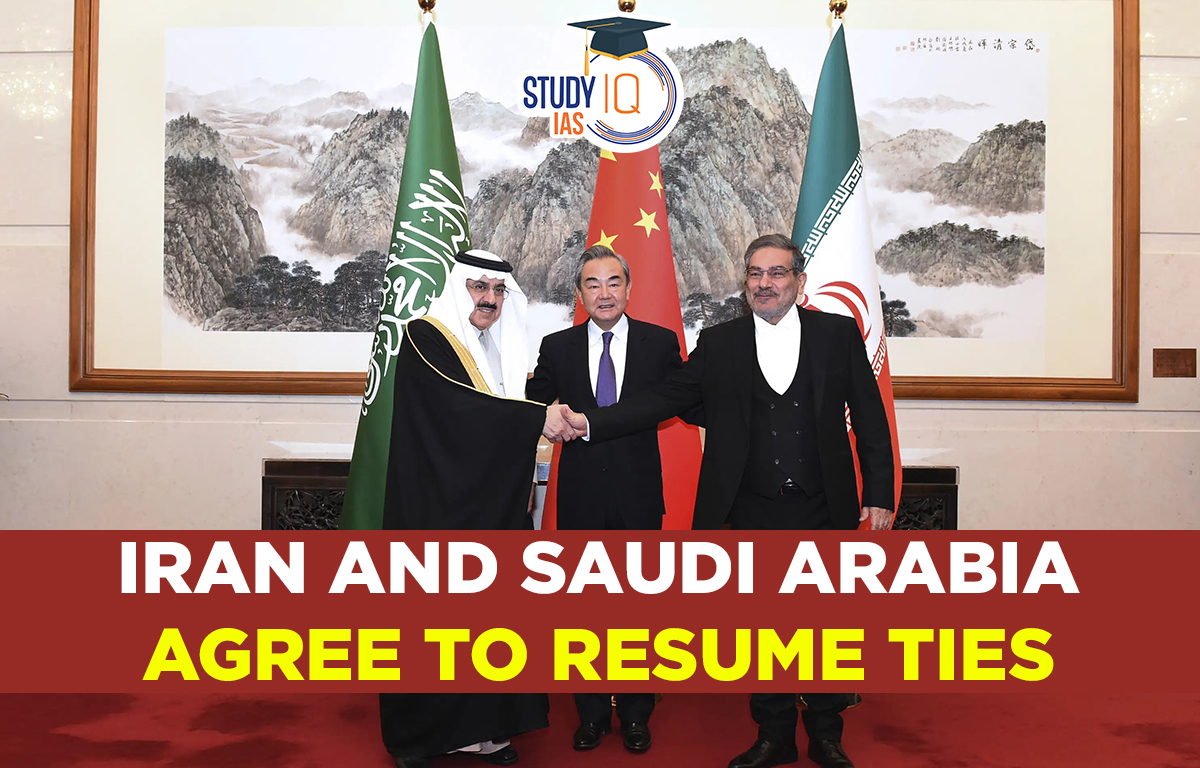Table of Contents
Context: Saudi Arabia and Iran have announced that they are restoring full diplomatic relations in a deal brokered by China.

Understanding the News
- Saudi Arabia and Iran will resume diplomatic relations that were snapped in 2016 and reopen their embassies and missions within two months.
- The two countries further agreed to revive the Security Cooperation Agreement signed in 2001 and 1998 pact for cooperation in trade, investment, technology and culture.
What Prompted Sudden Changes in Stance by Countries?
- Saudi Arabia “Vision 2030” Plan: It calls for diversifying the oil-dependent economy by attracting tourism and foreign investment, drawing millions of expatriates to the kingdom and turning it into a global hub for business and culture.
- Regional peace will be crucial to turning Saudi Arabia into the global hub that “Vision 2030” envisions.
- Saudi Arabia slowly moving away from the influence of the United States in its foreign policy.
- Iran: Agreement could accelerates its nuclear program after two years of failed U.S. attempts to revive a 2015 deal that aimed to stop Tehran from producing a nuclear bomb.
- China’s desire to be a global diplomatic power: China was able to play this role because it has maintained ties with both countries and purchases oil from both OPEC member states, despite U.S. sanctions on Iran.
- Latest deal points to China’s growing political and economic clout in the region.

Challenges Ahead
- Sectarian Division: Iran is the foremost Shia state in the world, and Saudi Arabia is considered to be the religious home of Sunni Islam.
- This difference has played a role in both sides being involved in multiple proxy conflicts against each other in Iraq, Lebanon, Syria and most devastatingly, Yemen.
- Geopolitical Struggle: In both the wars in Yemen and Syria, Iran and Saudi Arabia find themselves on opposite sides – these conflicts will continue to fuel antagonism between the two countries.
- US factor: Iran is critical of Saudi Arabia’s closeness with the United States. The US has crippled Iranian economy with its sanctions regime for decades.
- Concern of Saudi Arabia: It is varied of the large network of armed militias across West Asia that Iran funds and backs, seeing them as a threat to its own sovereignty as well as the regional balance of power.
Conclusion
- While Iran and Saudi Arabia may still fall out, for the time being, this diplomatic agreement has ushered in major change in geopolitical dynamics in West Asia and can be the start of a greater global geopolitical realignment.


 Amendments to New Drugs and Clinical Tri...
Amendments to New Drugs and Clinical Tri...
 Acid Attacks and the Search for Real Jus...
Acid Attacks and the Search for Real Jus...
 Doomsday Clock Reset to 85 Seconds to Mi...
Doomsday Clock Reset to 85 Seconds to Mi...

























